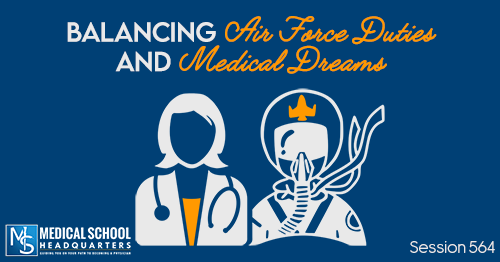The medical school interview is a gatekeeper that all premeds face at some point. An interview offer is an incredible accomplishment and a prime opportunity to bring your application to life.
Here are five questions you should first ask yourself before you’re seated in front of the admissions committee. (Of course, you should formulate your own honest answers to keep the conversation flowing–quoting would only lead to a dead-end.)
“What profession would you choose if not medicine?”
At face value, it may be easy to mention another health profession. There are so many intriguing options in the healthcare field alone–nursing, physician assistant, pharmacy, and physical therapy to name a few.
However, if you do have these professions on your mind as a back-up plan, it shows a lack of direction. As you well know, you don’t haphazardly stumble in and out of medical school. It’s a path filled with challenges and detours.
The key is that your destination is always in mind: earning your medical degree.
“Why do you want to become a doctor versus a nurse or PA?”
This was a question I asked myself again and again. I started my undergraduate years with the hopes of becoming a physician assistant. The lifestyle, compensation, and degree of autonomy all seemed to appeal to me. Plus, I reasoned, I’ll be able to find a PA-to-physician bridge program or go back to school to become a doctor if I’m unsatisfied.
I have no doctors in my family. My mom works with the marketing department at our local hospital. While that provides her with great insight into the business side of medicine, I initially didn’t feel that I had the support to make this practically irreversible, 10+ year commitment to medical training. I wasn’t sure if I had the brains, the drive, or the support and practical advice.
But one day my sophomore year, my mind started to change. The bulk of my premed courses were met with relative success. I dragged through the requirements for PA school. I took an Emergency Medical Responder course and learned several practical skills along with a shallow understanding of why they’re used. It frustrated me. I wanted to know the why behind the what.
[Related episode: Why Do You Want to Be a Doctor? You Need to Know This!]
I wanted to have the capabilities to draw upon a more interdisciplinary knowledge base to formulate a plan and diagnosis. I saw my future self in every other health profession, longingly looking to resonate with the doctors on my team.
Being a pre-PA student for half of my undergrad affirmed my drive to be a doctor.Click To Tweet“You have to be honest that you’re not doing this just to get an MD after your name,” a premed advisor declared, while staring into my soul. “I’m not.” I replied, without thinking twice. And that was simply the truth. Being a pre-PA student for half of my undergrad affirmed my drive to be a doctor. I wouldn’t have it any other way.
[Related episode: PA Turned MD Talks About Why He Made the Switch]
Define altruism
As a physician, one day someone’s life may depend on your character.Click To Tweet“I like science and I want to help people.” At the very least, that is something nearly all premed students have in common. You can’t make it through medical practice without engaging with science and helping a patient or two.
But altruism is deeper than that. Your job will be more than scripts, sutures, and charting notes. When treatment plan A, B, and C fail, you are going to be called. And when you’re called, if you’re sleep deprived, stressed, tired, hungry, or otherwise compromised, you still need to act and choose the best care for the patient.
You may rarely get acknowledgment or thanks. No one may realize when you choose the more labor-intensive option for the patient’s best interest. But you sleep easy knowing you did your best. To me, that’s altruism.
If you aspire to be a doctor, and you can’t say that you ever do things for others without hope of acknowledgment or compensation of any sort, it is time to be honest about your motivations. One day, someone’s life may depend on your character.
This was a post from one of our readers, Courtney M.
Dr. Gray’s Take
If you’ve made it to the interview, that means that the medical school thinks you have what it takes to get an acceptance. Medical schools interview only a small percentage of those who apply, and they accept an even smaller amount. The biggest question is what separates those who get an acceptance and those who don’t after being interviewed.
If you've made it to the interview, that means that the medical school thinks you have what it takes to get an acceptance.Click To TweetI’ve talked about this before in Session 146 (Common Medical School Interview Mistakes and How to Fix Them). You can listen here:
[smart_track_player url=”http://traffic.libsyn.com/medicalschoolhq/MSHQ146.mp3″ title=”Common Medical School Interview Mistakes and How to Fix Them”]
Mock Interviews
Mock interviews are the gold standard practice for your medical school interview. You can usually get mock interviews through your advising office. But I don’t recommend non-medical mock interviews, i.e. interviews conducted through standard career advising.
You need questions that are going to be asked by medical school admission committees, not business people, and you need feedback based on expertise in medical school admissions.
We offer one-on-one mock interviews for you. You can read all about our mock interview prep services here. And alternatively, we offer access to an anytime mock interview platform, where you can record yourself answering questions as often as you need.
Links and Other Resources
- Check out my book about the medical school interview, The Premed Playbook: Guide to the Medical School Interview.
- Related episode: Ten Medical School Interview Tips: Go in Ahead of the Rest
- Related episode: 5 Common Med School Interview Questions and How to Answer Them
- Need MCAT Prep? Save on tutoring, classes, and full-length practice tests by using promo code “MSHQ” at Blueprint MCAT (formerly Next Step Test Prep)!







